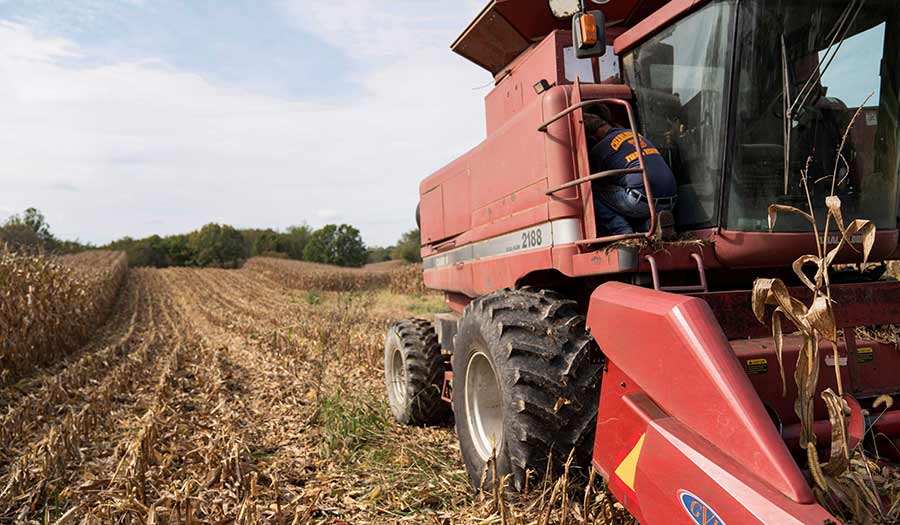 Reuters/Dane Rhys
Reuters/Dane Rhys
World News Desk
Learn the why behind the headlines.
Subscribe to the Real Truth for FREE news and analysis.
Subscribe NowCHICAGO (Reuters) – Dale Hadden cannot find any spare tires for his combine harvester. So the Illinois farmer told his harvest crew to avoid driving on the sides of roads this autumn to avoid metal scraps that could shred tires.
New Ag Supply in Kansas is pleading with customers to order parts now for spring planting. And in Iowa, farmer Cordt Holub is locking up his machinery inside his barn each night, after thieves stole hard-to-find tractor parts from a local Deere & Co dealership.
“You try to baby your equipment, but we’re all at the mercy of luck right now,” said Mr. Holub, a fourth-generation corn and soybean farmer in Buckingham, Iowa.
Manufacturing meltdowns are hitting the U.S. heartland, as the semiconductor shortages that have plagued equipment makers for months expand into other components. Supply chain woes now pose a threat to the U.S. food supply and farmers’ ability to get crops out of fields.
Farmers say they are scrambling to find workarounds when their machinery breaks, tracking down local welders and mechanics. Growers looking to buy tractors and combines online are asking for close-up photos of the machine’s tires, because replacements are expensive and difficult to find, said Greg Peterson, founder of the Machinery Pete website which hosts farm equipment auctions.
“As harvest ends, we will see farmers at equipment auctions not for the machinery—but for parts,” Mr. Peterson said. “We’re already hearing from guys talking about buying a second planter or sprayer, just for parts.”
For some farmers, the shortages are forcing them to reuse—or repair—old parts.
At their small welding shop in western Washington, Rami and Bob Warburton can barely keep up with all the orders from farmers needing something repaired from fittings for irrigation systems to a cracked bulldozer bucket.
“We were in the middle of a drought up here,” Rami Warburton said. “At that time, they couldn’t wait to water their fields for a month. The crops will be dead by then.”
‘Tylenol Moments’
Kinks in the supply chain due to COVID-19 shutdowns in manufacturing hubs in the United States and Asia, a container shortage snarling major ports, and a dearth of workers prevent equipment manufacturers from fully cashing in on a lucrative moment, when grain prices have soared to the highest in nearly a decade.
The Purdue University/CME Group Ag Economy Barometer, a monthly measure of farmer economic sentiment, fell 10 percent to its lowest level since July 2020 in early October. Supply concerns are weighing heavily on growers, with 55 percent of farmers surveyed saying that low inventories have affected their plans to buy machinery.
Access to steel, plastic, rubber and other raw materials has been scarce during the pandemic, and manufacturers are preparing for even more shocks after power shortages forced several Chinese smelters to cut production in recent weeks.
When executives from farm machinery maker AGCO Corp visited Midwest suppliers this summer, they found some companies were operating at only 60 percent staffing levels, said Greg Toornman, who oversees AGCO’s global supply chain management.
Mr. Toornman said staff levels are dropping at some suppliers in the Dakotas, Nebraska and Texas, as workers object to President Joe Biden’s vaccine mandate, drop out of the workforce for fear of getting COVID-19 or move to other jobs.
“It’s the perfect storm of Tylenol moments,” Mr. Toornman said. “It’s one headache after another.”
The supply squeeze has put particular pressure on equipment dealerships, who typically see their service business boom during the traditional September through November harvest season.
This year, some have resorted to sifting through decade-old inventory for solutions. One pain point for dealerships is an industry-wide shortage of GPS receivers, which are used to run tractor guidance and data systems.
At Ag-Pro, the largest privately-owned Deere & Co dealership in North America, staff in Ohio have been digging out GPS units that date back to 2004. Until now, they were essentially worthless.
But producers can still use them to record a digital harvest map of their farms—something many need when talking to their bankers, landlords and crop insurance agents.
More on Related Topics:
- Europe’s Economy Needs Help. Political Chaos in France and Germany Means It May Be Slower in Coming
- Buy Now, Pay Later Is More Popular Than Ever. It Can Cost More Than You Think
- When the Dollar Store Closes, U.S. Families on Food Benefits Lose a Lifeline
- Its Economy and Infrastructure Battered, Can Lebanon Afford a War with Israel?
- 7 Money-saving Tips for the Grocery Store


